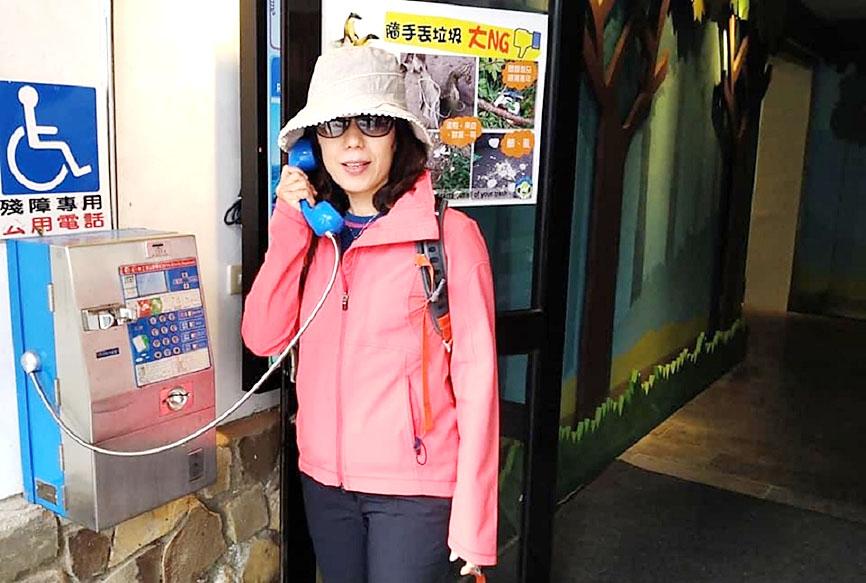Yushan National Park on Tuesday said a plan to remove the park’s last surviving payphone has been scrapped after park officials persuaded Chunghwa Telecom to keep the machine.
The telecom had previously said the payphone would be removed from the park’s Tataka Visitor Center, as the NT$22 revenue generated by the phone last year was insufficient to justify its upkeep.
The phone was installed in 1994, long before the adoption of mobile devices, the park said on Facebook.

Photo: CNA
However, the payphone’s value cannot be measured in dollar terms, it said, adding that people who forget to take their cellphones with them or charge their devices, as well as foreign travelers without SIM cards, need the coin-operated machine.
“For visitors without a cellphone feeling like they are lost at sea, the payphone could be a great source of joy, especially during that call to the folks at home,” the park said.
“Through the years, [the payphone] has served the public from the age of landline to 5G networks like an old, faithful friend. We urge the public to continue supporting the phone [by using it] so that it will see many more [years of use] at the Tataka Visitor Center,” it added.
Some of the payphones in the county go unused for two months at a time and phones that do not turn a profit are put on a shortlist for removal, the office said.
Exceptions are made for payphones in remote villages and communities, it said, adding that those machines have an added geolocation function for police, firefighters and rescue workers to find the caller in an emergency.
After discussions with the park, the telecom now considers the Tataka Visitor Center payphone as a unit in a remote community that would be maintained regardless of the cost, it said.
Chunghwa Telecom operates 1,000 payphones nationwide, down about 60 percent from a peak of 2,500 payphones, the office said.

The manufacture of the remaining 28 M1A2T Abrams tanks Taiwan purchased from the US has recently been completed, and they are expected to be delivered within the next one to two months, a source said yesterday. The Ministry of National Defense is arranging cargo ships to transport the tanks to Taiwan as soon as possible, said the source, who is familiar with the matter. The estimated arrival time ranges from late this month to early next month, the source said. The 28 Abrams tanks make up the third and final batch of a total of 108 tanks, valued at about NT$40.5 billion

A group from the Taiwanese Designers in Australia association yesterday represented Taiwan at the Midsumma Pride March in Melbourne. The march, held in the St. Kilda suburb, is the city’s largest LGBTQIA+ parade and the flagship event of the annual Midsumma Festival. It attracted more than 45,000 spectators who supported the 400 groups and 10,000 marchers that participated this year, the association said. Taiwanese Designers said they organized a team to march for Taiwan this year, joining politicians, government agencies, professionals and community organizations in showing support for LGBTQIA+ people and diverse communities. As the first country in Asia to legalize same-sex

MOTIVES QUESTIONED The PLA considers Xi’s policies toward Taiwan to be driven by personal considerations rather than military assessment, the Epoch Times reports Chinese President Xi Jinping’s (習近平) latest purge of the Chinese People’s Liberation Army (PLA) leadership might have been prompted by the military’s opposition to plans of invading Taiwan, the Epoch Times said. The Chinese military opposes waging war against Taiwan by a large consensus, putting it at odds with Xi’s vision, the Falun Gong-affiliated daily said in a report on Thursday, citing anonymous sources with insight into the PLA’s inner workings. The opposition is not the opinion of a few generals, but a widely shared view among the PLA cadre, the Epoch Times cited them as saying. “Chinese forces know full well that

Travel agencies in Taiwan are working to secure alternative flights for travelers bound for New Zealand for the Lunar New Year holiday, as Air New Zealand workers are set to strike next week. The airline said that it has confirmed that the planned industrial action by its international wide-body cabin crew would go ahead on Thursday and Friday next week. While the Auckland-based carrier pledged to take reasonable measures to mitigate the impact of the workers’ strike, an Air New Zealand flight arriving at Taipei from Auckland on Thursday and another flight departing from Taipei for Auckland on Saturday would have to